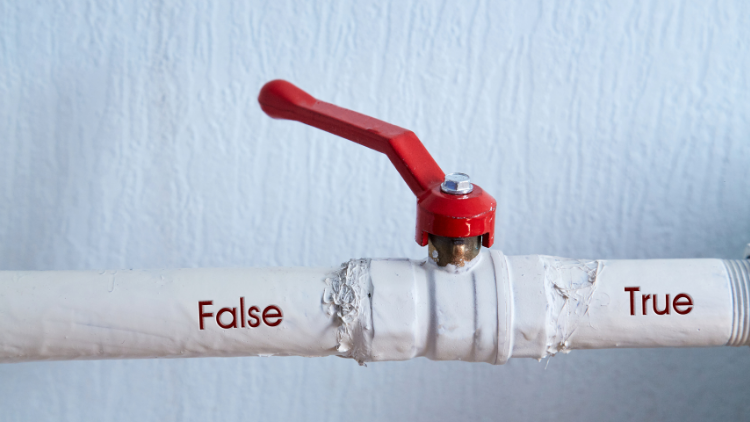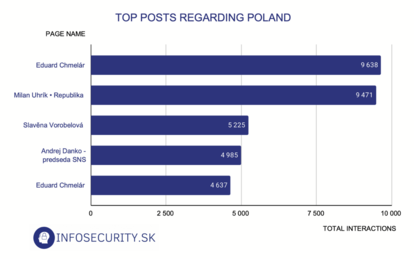DISINFORMATION
The European Parliament is under attack for declaring Russia a terrorist state, pro-Russian actors are exploiting the missile incident in Ukraine

Infosecurity.sk presents an overview of disinformation trends that have been on the rise in information space in the past two weeks:
- The most dominant topic among Slovak disinformation actors was the November 15 missile explosion in Poland, which was widely utilized to criticize mainstream media and the Slovak government.
- Additionally, pro-Russian actors widely condemned a resolution of the European Parliament, which declares Russia to be a state sponsor of terrorism. According to them, the decision is irrelevant and they proceeded to point to other unrelated international conflicts.
- Many disinformation actors also shared various anti-western narratives, which continue to gradually gain intensity in Slovak information space.
Bending the Truth About the Missile Explosion in Poland
Since the beginning of November, Russia has launched its largest-ever missile strike against Ukraine’s infrastructure. On November 15, 2022, two civilians were killed by a stray missile explosion on Poland’s southeastern border. Moscow was quick to deny any involvement in the blast.
When top Slovak representatives, including president Zuzana Čaputová, published their official statements regarding the situation, they were promptly attacked by many political actors who sought to score political points. Additionally, despite the ongoing investigation, various disinformation quickly started to spread.
One of the first to exploit the situation for political gain was Milan Mazurek, a member of the Slovak parliament under the far-right Republika party. He posted a video, in which he denounced the rhetoric of labelling the exploded missiles as “Russian” and called it a “media hoax”. He also accused the Slovak government of warmongering. In an expressive manner, he stated: "They started calling for a military conflict with the Russian Federation. They talk about Slovakia having to help defend every inch of NATO territory. Without knowing the facts, they immediately drove Slovakia to war."
The same narrative was also pushed by the former prime minister Robert Fico, who claimed that the members of the Slovak government are “warmongers who were ready to go to a world war with the Russian Federation." He also ironically stated, that "they were sad that we weren't going to fight the Russians because we gave almost all of our weapons to Ukraine."
Spreading this false narrative is especially harmful since none of the top state representatives announced anything about declaring a war on Russia. On the contrary, they encouraged the public to wait for the assessment of the whole situation and merely talked about protecting the NATO territory, which Slovakia is a part of and has an obligation to do.
Many disinformation actors also exploited this narrative of deliberate warmongering of the Slovak government and accused them of manipulation. Pro-Russian disinformation page BRAT za BRATA (Brother for Brother) called the Slovak police force the “Office of War Propaganda” and criticized them for posting about the incident in a way that painted Russia as the aggressor. This nit-picking of information has since been denounced by the Slovak police.
Opposition MP Ľuboš Blaha is currently banned on Facebook (due to repeated violations of Meta's rules regarding hate speech, bullying and harassment, inciting violence, as well as disinformation) but continues his activity on Telegram. There he proceeded to attack the Slovak government for the reasons mentioned above and accused the media of disinforming the public: “I just wonder that if the Ukrainian army was using US missiles, would the headline read - US missiles hit Poland. Clearly not - they just need to manipulate.”
Spreading narratives such as these is highly problematic, since it deliberately diverts the attention from a myriad of war crimes committed by Russian forces in Ukraine, as well as the underlying fact, that if the Russian Federation had not invaded Ukraine, a similar incident would have never happened.
Slovak Disinformers Shared False Narratives About the Missile Tragedy in Poland
Since the missile explosion in Poland was closely followed in Slovak information space in the past two weeks, we also looked at it through an optic of a list of disinformation actors in Slovakia. We used the CrowdTangle analysis tool to analyze the most popular posts on Slovak Facebook that include the keyword “Poland”. Posts were evaluated based on the total number of interactions (the sum of all reactions, comments, and shares).

First place belongs to Eduard Chmelár, a former presidential candidate and a political commentator who has repeatedly spread pro-Russian disinformation. In a Facebook post, he claims that the citizens of Slovakia are “victims of information war lead by their own government” and that the members of the government are “the same cowards spreading disinformation who want to ban and block competitors for spreading hoaxes.”
MEP (and chairman of Republika party) Milan Uhrík also pushed the warmongering narrative and stated: “Escalating conflict with Russia over Ukrainian missile landed in Poland? Only fools in the Slovak government can do that.” This statement is highly misleading since Russia is the only actor that has been systematically intensifying the conflict.
Slavěna Vorobelová, a member of the far-right Kotlebovci-ĽSNS party, proceeded to attack mainstream media and the Slovak government in a similar manner. However, she goes as far as to claim that the incident was a false flag provocation in an attempt to drag the whole of NATO directly into the conflict in Ukraine, including Slovakia. This statement is nothing but a baseless conspiracy theory, given that there exists no evidence of any other involvement in the explosion and the investigation is still ongoing.
Andrej Danko, a leader of a political party Slovenská národná strana (Slovak National Party), criticised president Zuzana Čaputová and prime minister Eduard Heger for the reasons mentioned above. These include false allegations of warmongering and misleading the public.
Finally, Eduard Chmelár published another post on his Facebook page claiming that “Kiev is constantly trying to drag NATO into the war and its provocations are extremely dangerous” and compares the Ukrainian government to Putin’s regime, which is unjustifiable in the scope of current Russian aggression in Ukraine.
European Parliament resolution sparks a wave of hate from disinformation actors
The European Parliament has recently declared Russia a "state sponsor of terrorism" over the "brutal and inhumane" acts inflicted upon Ukraine and its citizens since the launch of the invasion. This step has not been taken lightly by many pro-Russian actors, who swiftly took to social media to condemn the EP decision.
In his Telegram post, Ľuboš Blaha expressively called the European Parliament a “bunch of losers” and criticised the decision by stating: “Strange that they did not think to declare Ukraine, which demonstrably organised the terrorist attack on the Crimean Bridge, as a terrorist state. Strange that it has not occurred to them to declare the USA as a terrorist state, when it has fought imperial wars in Iraq and Afghanistan, bombed Yugoslavia and organised terrorist forces in Latin America. Strange that it has not occurred to them to declare themselves as terrorists when they are weaponising Ukraine, supporting the Bandera regime and prolonging the war.” By comparing these cases to Russian war crimes in Ukraine, he actively takes information out of context and simplifies the complexity of these situations.
Milan Uhrík also pushed a similar narrative stating that “if we were to measure by the same yardstick, the US and Ukraine, which have also committed atrocities, are also terrorist states.” He also adds: “our 'allies', who apparently caused the explosion on the Nord Stream pipeline so that the EU had to buy three-times more expensive gas from America, should also be terrorist states.” This conspiracy theory about the Western involvement in the Nord Stream explosion has been spread by him repeatedly. He is still yet to provide any evidence for his claims.
The aforementioned posts are a typical case of whataboutism, which sole purpose is to divert attention from one issue (in this case, the Russian aggression) to another completely unrelated issue. This tactic of pointing to other incidents and international conflicts has been widely used by disinformation actors during the whole duration of the war in Ukraine.
Anti-Western Narratives Continue to Pollute the Slovak Information Space
Even though the attacks on the West, especially the USA and the European Union, are not a new occurrence when it comes to Slovak disinformation actors, they seemed to be gaining in intensity recently.
The most popular post containing anti-western sentiment belongs to Milan Uhrík, who posted a video of his speech in the European Parliament. In it, he criticises the West for labelling China a threat, while it is the USA that leads wars in the world. He expresses his dislike of European rhetoric by saying “we label all states outside of the Western bubble as undemocratic, totalitarian or threatening.” Meanwhile, it is clear that China’s authoritarian regime has become increasingly repressive in recent years under the rule of the Chinese Communist Party, which continues to tighten state control over every aspect of governance and civil life.
Many anti-western posts were directly tied to the commemoration of the Velvet Revolution, which in the year 1989 marked the beginning of an end of the communist regime in Slovakia and the Czech republic.
Disinformation actors exploited the message of democracy and proceeded to turn it against Slovakia and its’ western partners. Eduard Chmelár claimed that politicians systematically fail in fulfilling the promises they made to the citizens and according to him “freedom and democracy are not being deepened but curtailed, we are not catching up with the West but have become its colony, and Europe is no longer a peace project but, thanks to the exporting of conflicts, we are at permanent war.“
Disinformation website Bádateľ, which is well-known for spreading dangerous conspiracy theories, stated in a Facebook post that “after the fall of ‘totalitarianism’ we wanted to catch up with the West. Today, many would be grateful for the standard of living from the days of ‘totalitarianism’.”
This painting of an oppressive communist regime as free and as a time to feel nostalgic for and to “go back to” is meant to induce dissatisfaction with the current political climate, which has no base in reality.
Project Infosecurity.sk organized by Adapt Institute, which is supported by the Prague office of the Friedrich Naumann Foundation for Freedom, continuously monitors the activities of both Slovak and foreign disinformation actors, but focuses mainly on the former. The project activities are built upon daily monitoring of emerging disinformation, hoaxes, and conspiracy theories in the online information space. This approach allows the analysts to identify disinformation posts and narratives that resonated with the public the most, as well as to find out where they originated, and how they spread and evolved on social media. The report takes the form of a bi-weekly summary of arising trends in the spread of malicious information content online. Based on that, Infosecurity.sk can warn the public about emerging and current trends in the field of disinformation, manipulation, and propaganda

